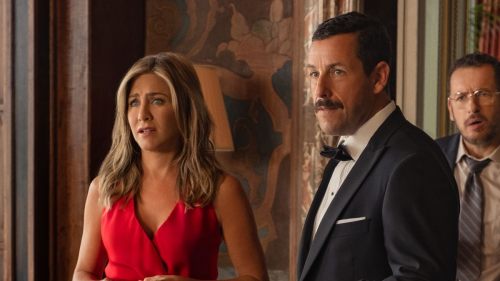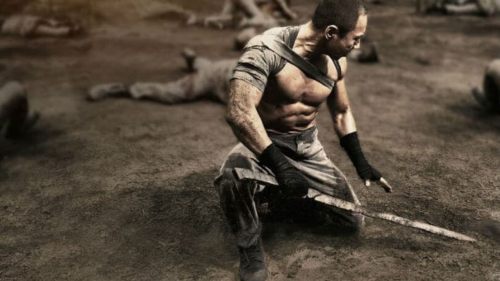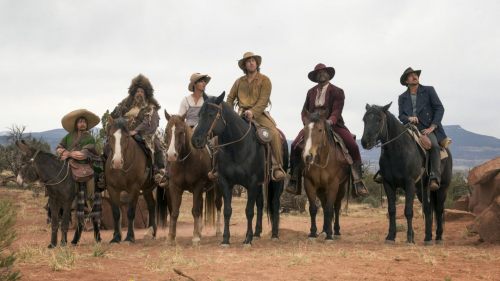Black Superhero Music: THE GET DOWN Is Amazing
“This is black superhero music right here baby,” Jay-Z says in the outro of Roc Boys (And the Winner Is)..., and that phrase kept coming to mind as I watched The Get Down, the best Netflix original series this year. The first half of The Get Down’s first season plays out like the origin story of a black (and hispanic) superhero team, a triumphant and fantastical tale of underdogs bringing their unique powers together to form a whole that is bigger and better than they can be alone. But it isn’t just the origin of The Get Down Brothers, or whatever their final name will be, it’s the origin of a culture, of a way of life, of the last truly great American art form.
First things first: I am not a hip hop guy. I like what I like, and while my phone has some rap tracks on it, they tend to reflect my age and my whiteness (I don’t mean there’s ICP, I mean you’ll find old school stuff and alternative hip hop from the 90s). I say that not to assert my bona fides but to admit my lack thereof; when hip hop was happening in New York City in the 80s I was a staunch rocker. But even still - even as I was carrying Bark at the Moon and Too Tough to Die to school to share with friends - I couldn’t be unaware of the culture exploding around me. You couldn’t grow up in Queens in the mid-80s and be unaware of Roxanne, Roxanne and Roxanne’s Revenge.
But you don’t have to live and breathe hip hop to love The Get Down. You have to love coming of age stories and stories about creative and driven young people following their own muses. You have to love stories about people refusing to accept the place society has assigned to them, people who seek to make their own world. You have to love stories about love, about passion, about young people throwing themselves fully into their art and making mistakes while being headed for greatness. The show is, on the surface, about the birth of hip hop in the Bronx in the late 70s but it’s really about young people finding their place and their meaning. Hip hop is important, but this is a show about its earliest days; even the lead characters don’t know what it is when the series starts. You don’t have to understand the importance of a visit to 1520 Sedgewick Avenue in the Bronx - the show will make you feel it in your gut.
As someone who isn’t a real hip hop guy I’m sure many of the details are off, or wrong. It’s just the nature of this sort of story - reality has to get folded, spindled and mutilated to fit into the confines and needs of narrative. But what The Get Down gets right is the energy of starting a new movement, of being young and seeing the world in your own way, of sneaking out of your house late at night to, for the first time, hear the songs that will change and save your life. This is a show created by Baz Luhrmann (he directed the pilot), so it has that electric, unfocused energy that he brings to his work - energy that some people simply despise. For me it feels like the jazzed up working of a great brain, a pop explosion of color and light that can be overwhelming and verge on the abstract in the moment but that, when looked at from the other side of the story, takes on manic meaning. The Get Down’s pilot is like that, but the remaining episodes rein it in a bit, maintaining a sense of explosive excitement while not quite flirting with incoherence in the way Luhrmann does.
If it gets some of the details wrong, that’s just part of the brilliance of The Get Down. The show isn’t a faithful recreation of anything but rather a memory piece, a larger than life version of the true story. Like hip hop itself The Get Down melds mythologizing and social realism into a potent whole; also like hip hop itself The Get Down reflects other pieces of the culture to create its own unique self. From Black Caesar to Saturday Night Fever to Fists of Fury to Star Wars, The Get Down synthesizes them all into a great big melting pot. Unlike other nostalgia exercises where the references feel like museum pieces or ritual pieces of storytelling to be acted out in religious awe, The Get Down makes its references and influences feel fresh and immediate. In episode six when The Get Down Brothers open their set with music from Star Wars it doesn’t feel like a 40 year old relic encased in amber but rather a living, breathing piece of the immediate pop culture - and since this is a show set in the summer of 1977, it truly and really is.
The Get Down’s cast is a diverse group of South Bronx kids, with young poet Zeke (Justice Smith, in a star-making performance) as the focus. Words come naturally to Zeke, but he’s embarrassed to share his emotionally vulnerable art in class (one of the best moments in the show happens in the pilot as Zeke recites a poem he wrote about the murder of his mother). When he learns about the world of hip hop, with its MCs valuing verbiage and wordplay above all else, he finds the place he belongs. Meanwhile he’s in love with Mylene, a church girl with the voice of all the angels who is trying to break into the world of secular disco with the help of an over-the-hill sleazebag producer (the great Kevin Corrigan). Herizen F. Guardiola plays Mylene and while the first half of the first season doesn’t give her as much to do as I would like (I suspect Mylene’s story blossoms in part two next year), Guardiola has one of the most stunning screen presences of the year. Someone said you should watch The Get Down to see who will be the big stars in Hollywood in ten years, and Justice Smith and Herizen Guardiola could certainly go far.
Every MC needs a DJ, and Zeke’s DJ is Shaolin Fantastic, the breakout character of the show. We first learn about him as a semi-urban legend - a graffiti artist with a preternatural ability to parkour his way anywhere and leave his tag - but we soon learn that he’s actually just a regular guy with a dream. Dope’s Shameik Moore seems to take pleasure in deconstructing that cool dude from the pilot, letting us see that Shaolin is as much a beginner at hip hop as Zeke is, taking Kung Fu-style lessons from Grandmaster Flash. Shaolin’s complexity finds him trapped between the world of art and the world of crime, where he is the kept boy of Fat Annie (Lillias White), a crime boss who is itching to go to war with other gangs.
Filling out the main youth leads is Jaden Smith as Dizzee, a hyper-afro-ed graffiti artist who looks up to Shaolin Fantastic like a god. Smith plays Dizzee beautifully, a kid with a cosmic consciousness and a tender soul who brings bouquets of spray can beauty to his blighted surroundings. I don’t want to give away too much of Dizzee’s arc in the first half of the first season, but when he meets a white tagger from downtown Dizzee begins to understand things about himself that he maybe couldn’t ever comfortably express in the South Bronx. Alongside Dizzee are a duo of kids whose personalities only begin to truly emerge as we get to episodes five and six - Boo Boo (TJ Brown Jr), who it turns out has an otherworldly singing voice for a 14 year old and Ra Ra (Skylan Brooks), who can't keep on the beat because his flow is so funkily fast. Together Zeke and Dizzee and Ra Ra and Boo Boo and Shaolin come together to form The Get Down Brothers, and they look to take on all the kings of hip hop in the land of the South Bronx.
Above the kids are the politicians and church leaders. Giancarlo Esposito is Mylene’s puritanical preacher father, and Jimmy Smits is his brother, a politician whose sleaziness is 100% in the service of his constituents. Smits’ Papa Fuerte Cruz is a great character, a man doing whatever he must to bring the South Bronx back to life, and because we know the history of his neighborhood we know that his story must be a tragedy. He finds himself embroiled in mayoral politics (character actor Frank Wood is so good as then-mayoral candidate Ed Koch that I hope HBO gives him a movie of his own) and begins discovering that there are bigger sharks in the waters of New York City politics.
All of these stories swirl around one another, with each episode highlighting the energy and the beauty of the music and the community. The Get Down doesn’t ignore the poverty and despair of the South Bronx in the late 70s but it also doesn’t wallow in it; this is a show that explains how these hard times can lead to great things. There are drugs and gangs and crime, but even the characters who are involved in that stuff, like Shaolin, aren’t drug dealers or gang bangers. The Get Down breaks out of the cliches of stories about the ghetto to talk about the lives of the people who aren’t the broken or the anti-social, to tell the stories of people who are full of hope and life.
We know that Zeke makes it; the show is told with a framing device wherein an older Zeke in the 90s - now known as Books - raps about growing up in the Bronx to a stadium full of fans. Daveed Diggs of Hamilton plays the adult Zeke, but Nas provides the raps (which is silly as Diggs is a great rapper. Check out his group clipping. if you don’t believe me), all of which are tinged with sadness. We know that Books makes it out, but what about Mylene? What about Shaolin? By the way, having this framing device means that The Get Down has the best ‘previously on’ segments of any show in history - they’re all rapped by Nas.
The Get Down is a weird beast, if only because it’s not finished. Due to budget and time constraints the first season has been broken into two parts; what we have right now on Netflix actually feels like it reaches a reasonable climax, but many story points are clearly just getting started. Obviously the whole of The Get Down is still unknown to us, but these six episodes are something truly remarkable. I found myself jumping up and down with excitement while watching the show, crying with joy and sadness, shouting out in happiness and despair at the characters and their decisions. I don’t know the last time I watched a TV show that felt so alive, so present.
There are a lot of complaints that could be lodged against The Get Down, and many of them are probably even true (I honestly understand if some people have a hard time getting past the Luhrmann-directed pilot, which veers into incomprehensibility in some scenes. There’s weak editing in the pilot), but none of them register for me. This is a show that has such exuberance that I don’t need it to be technically perfect (although it often is, and its use of green screen is so thematically appropriate that the green screen sometimes feels like a matte painting in an Old Hollywood epic - just the kind of gorgeous scale and craft that trumps realism). An adrenaline burst of joy, The Get Down is like no other nostalgia delivery system of the day. It isn’t a show mired in the past, it isn’t a show stumbling over itself to homage and genuflect in the direction of all of its influences. It’s a show that is vital and immediate, a show that feels like right now, that has all the speed and fury of the internet age but is about a time when a physical record - that disc of vinyl we now collect as hipsters - had real, true, irreplaceable value. It’s a show about the past but with the sensibilities of today. Hell, of tomorrow even, as Luhrmann’s kinetic style still feels ahead of the curve.
For some reason - I have my cynical thoughts why - The Get Down has not been getting the attention that is heaped on many other Netflix shows. Hopefully some of you guys take the time to give these six episodes a shot. Even if hip hop isn’t your culture, The Get Down is ready to explode in your heart with the fierceness of two b-boys battling on the beat in a back alley.



